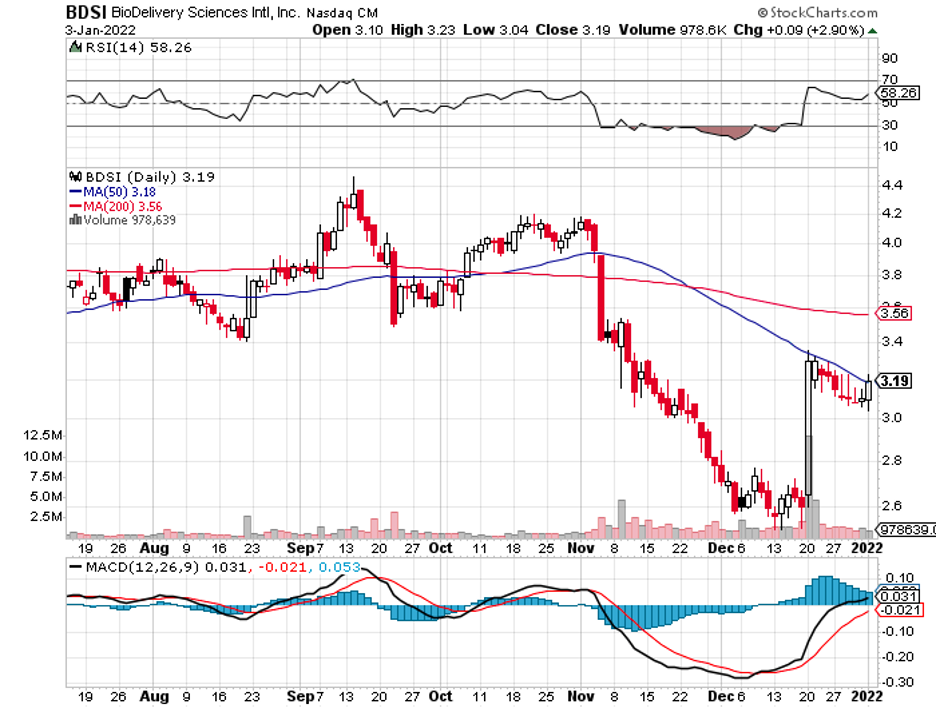A Biotech Diamond in the Rough
Small-cap names tend to have a terrible reputation. However, the possibility of discovering a diamond in the rough pulls traders back in the game over and over.
Fortunately, applying a bit of critical thinking in sifting through the seemingly endless lists of small-cap companies can yield a handful of names worth consideration.
In the biotechnology and healthcare sector, one name that holds the potential is BioDelivery Sciences International (BDSI).
While it’s understandable if you’ve never even heard of BDSI, this company has actually been making waves in the field of severe pain management.
To date, it has three drugs out in the market and holds the patent for a slow-release biofilm technology used to administer these medications. Simply, BDSI is proving to be a profitable and fast-growing company.
The company’s main product is Belbuca, an opioid medication targeting chronic severe pain.
The competitive edge of Belbuca against other drugs is that it’s not an oral pill. Instead, it’s a tiny film that patients keep in their cheeks. This film then slowly dissolves, offering more potent pain relief over time.
Moreover, Belbuca is more difficult to abuse, making it a more attractive option for physicians to prescribe.
At the moment, Belbuca has a 4.7% market share of the long-acting opioid treatment segment.
While that sounds like an unimpressive number, this achievement becomes more pronounced when you find out that Belbuca only held 0.5% of the market when it launched in the fourth quarter of 2017.
By the first quarter of 2021, its market share expanded by 25% year over year, indicating that segment penetration is moving forward swimmingly despite the pandemic.
In fact, Belbuca’s revenues increased by over 95% in the last 3 years.
It also reported that its trailing-12-month earnings since the first quarter of 2020 have skyrocketed to a jaw-dropping 233%.
More excitingly, BDSI successfully defended its patent exclusivity against competitors.
Recently, it managed to ward off attempts from more prominent names like Teva Pharmaceuticals (TEVA), which hoped to gain access to BDSI’s slow-release biofilm technology.
Bolstering its hold on the pain management market, BDSI has also been successful in marketing Symproic.
This prescription medication, which targets opioid-induced constipation therapies, has seen a steady rise in market share over the past 2 years.
By the first quarter of 2021, Symproic has managed to take hold of 12.6% market share, making it a promising partner to the company’s major growth driver, Belbuca.
Highly aware of the growing competition in the opioid market, BDSI has decided to venture into other segments as well.
In September 2021, the company acquired the rights to acute migraine pain medication Elyxyb for $15 million.
Elyxyb is the first-ever FDA-approved, ready-to-use oral drug aimed to treat acute migraine. In terms of peak sales, BDSI is projected to rake in $350 million to $400 million from this acquisition.
BDSI plans to launch its own take on Elyxyb by the first quarter of 2022, with the goal of adding another catalyst in its growth story and a new revenue stream.
Looking at its history and trajectory, it’s evident that things are heading towards a bright future with BDSI.
This small-cap company managed to sustain the expansion of its market share and boost its sales growth despite the pandemic and the patent challenges from bigger rivals.
Moreover, its balance sheet looks solid. Its margins and cash flow have been exhibiting notable improvements as well.
Simply, there remains no identifiable business concern that might cause it to tumble in the future.
Overall, BDSI’s long-term risk-reward outlook still appears to be attractive regardless of the market’s less-than-stellar reaction to the stock in 2021.
Needless to say, BDSI’s remarkable performance hasn’t been convincing enough for investors to believe that the stock is worth their money.
That turns this promising $315.16 million market cap biotechnology company into an exciting opportunity for deep-value investors searching for diamonds in the rough and an astoundingly cheap growth play.


